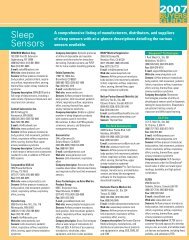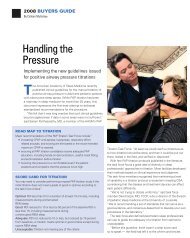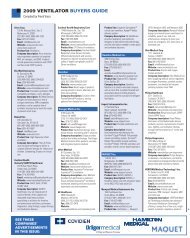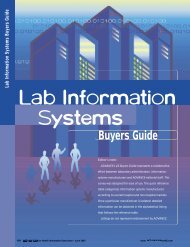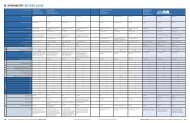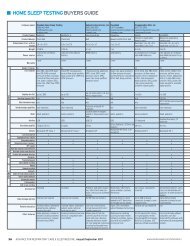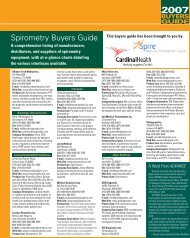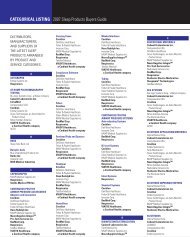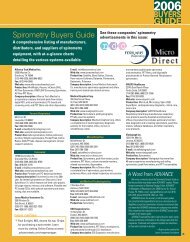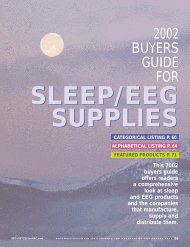View Full Screen - ADVANCE for Respiratory Care and Sleep ...
View Full Screen - ADVANCE for Respiratory Care and Sleep ...
View Full Screen - ADVANCE for Respiratory Care and Sleep ...
You also want an ePaper? Increase the reach of your titles
YUMPU automatically turns print PDFs into web optimized ePapers that Google loves.
■ <strong>Sleep</strong> Tracks<br />
By Valerie Neff Newitt<br />
Going Night-Night<br />
Duke’s pediatric lab drives satisfaction<br />
with child-centered approach<br />
The Duke Pediatric <strong>Sleep</strong> Lab in Durham, N.C., treats all<br />
children, all the time — seven nights a week, 363 days a year. The<br />
staff, including four sleep technologists, runs 450 studies annually,<br />
<strong>and</strong> numbers are increasing.<br />
Based in the division of pediatric pulmonary <strong>and</strong> sleep medicine of<br />
Duke University Medical School’s department of pediatrics, which is<br />
nationally ranked No. 9 by U.S. News & World Report, the Duke<br />
Pediatric <strong>Sleep</strong> Lab does its part to uphold that lofty reputation by<br />
earning multiple internal awards <strong>for</strong> driving high patient satisfaction.<br />
The physical components at Duke are kid-friendly — bright colors,<br />
a big fish tank, kid-sized equipment. And while a multidisciplinary<br />
team of care providers ensures a diversity of expertise at the clinic, team<br />
staffers all have one thing in common: Pediatrics. Period.<br />
At some sleep centers that mostly serve adults <strong>and</strong> the occasional<br />
child, their sleep techs may be competent but not necessarily adept at<br />
working with children. “If you go to an adult lab, the vast majority of<br />
patients are obese with sleep-disorder breathing,” explained Richard<br />
M. Kravitz, MD, associate professor of pediatrics at Duke University<br />
Medical School <strong>and</strong> medical director of the Duke Pediatric <strong>Sleep</strong> Lab.<br />
“Yes, we have children with sleep-disorder breathing, but while the<br />
disease may be the same, the etiology is different.”<br />
Dr. Kravitz described the lab’s usual patient population: Fifty percent<br />
have sleep-disorder breathing related to enlarged tonsils <strong>and</strong> adenoids,<br />
20 percent are related to obesity, <strong>and</strong> 10 percent related to cranial facial<br />
abnormalities <strong>and</strong> concerns about associated sleep apnea.<br />
“The rest are hypersomnolent kids — they might have ADD or be<br />
sleep-deprived because of sleep apnea,” he said. “And we’re finding more<br />
narcolepsy among children than anyone suspected existed. It was rarely<br />
ever diagnosed because the mindset was, ‘Children don’t get narcolepsy,<br />
so no need to look <strong>for</strong> it.’ Now we’re realizing most narcoleptics<br />
probably had symptoms presenting in childhood. But what you don’t<br />
look <strong>for</strong>, you never find.”<br />
<strong>Sleep</strong> study not a ‘given’<br />
Securing positive outcomes <strong>for</strong> Duke’s young charges begins by taking<br />
a history. Even at this preliminary phase, some sleep centers drop the<br />
ball. “It’s a matter of under-recognizing kids; that’s problem number<br />
one,” Dr. Kravitz said.<br />
Essential inquiries include:<br />
• Does the child snore<br />
• If the child snores, are other things going on<br />
• Is he doing poorly at school<br />
• Is she drowsy<br />
• Is there a strong history <strong>for</strong> sleep apnea<br />
• Does he have pauses Gasps<br />
• Does she experience restless sleep<br />
• Is there secondary enuresis<br />
• Does the child experience morning headaches<br />
• Daytime tiredness<br />
Next comes an assessment, of which a sleep study might be part.<br />
Dr. Kravitz is adamant that too many unnecessary pediatric sleep<br />
studies are undertaken.<br />
“A parent could say, ‘Johnny won’t fall asleep at night. I want a sleep<br />
study.’ So a study is done, <strong>and</strong> guess what It’s normal,” Dr. Kraviz said.<br />
“That parent has just spent thous<strong>and</strong>s of dollars on a study Johnny<br />
never needed because he has behavioral sleep problems. Parents need<br />
to discuss root causes <strong>and</strong> get their child proper therapy. Every child<br />
with a sleep problem deserves a sleep assessment, but not every child<br />
requires a sleep study.”<br />
Patience makes the difference<br />
Dr. Kravitz gives credit <strong>for</strong> Duke’s high patient satisfaction scores to<br />
his sleep techs’ ability to focus simultaneously on the child <strong>and</strong> the<br />
parent. “We tell families what to expect, <strong>and</strong> explain they have to be<br />
com<strong>for</strong>table be<strong>for</strong>e the child will be com<strong>for</strong>table,” Dr. Kravitz said.<br />
“An invested, cooperative parent is priceless.”<br />
He also praises his sleep techs <strong>for</strong> their consummate calm <strong>and</strong> patience.<br />
It’s a nightly challenge to spend a half hour or more hooking up a young<br />
child who immediately wants to yank off the set of electrodes.<br />
“You have to keep going into the room, explain to the child why they<br />
have to keep all this stuff on,” said Stephen Glinka, RPSGT, lead sleep<br />
photo COURTESY/DUKE PEDIATRICS<br />
Lead technician Stephen Glinka, RPSGT, positions sensors<br />
as he preps his young patient, Aaliyah Wilson, <strong>for</strong> a sleep study<br />
at Duke Pediatric <strong>Sleep</strong> Lab in Durham, N.C.<br />
12 <strong>ADVANCE</strong> <strong>for</strong> Healthcare <strong>Care</strong>ers



